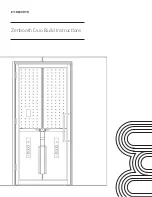
7
However pelvic floor muscles may
become weak. If your pelvic floor
muscles
become
stretched
or
weakened, your pelvic organs may no
longer be fully supported and you may
lose control of your bladder or bowel
movements.
For some women, the pelvic floor
muscles can also become too tight.
This condition is less common, but it
can lead to pelvic pain and make it
difficult for you to empty your bladder or
bowel completely.
Common signs that can indicate a
pelvic floor problem include:
•
Accidentally leaking urine when you
exercise, laugh, cough or sneeze
•
Needing to get to the toilet in a hurry
or not making it there in time
•
Constantly needing to go to the toilet
•
Finding it difficult to empty the
bladder or bowel
•
Accidentally losing control of the
bladder or bowel
•
Accidentally passing wind
•
Pain in your pelvic area
•
Painful sex, or
•
A prolapse
In women, this may be felt as a bulge in
the vagina or a feeling of heaviness,
discomfort,
pulling,
dragging
or
dropping. This occurs when one or
more of the pelvic organs (bladder,
bowel or uterus) become displaced and
sag down into the vagina. It is very
common in the United Kingdom and
occurs in about 40% of women.
Symptoms
tend
to
become
exacerbated towards the end of each
day and if left untreated, they will
generally worsen over time.
In men, this may be felt as a bulge in
the rectum or a feeling of needing to
use the bowel but not actually needing
to go.
Like other muscles in your body, the
pelvic floor can be strengthened with
regular exercise. Building pelvic floor
strength enables the muscles to better
support your pelvic organs, improves
your bladder and bowel control and can
stop accidental urine, faeces or wind
leakage.
It can also reduce your risk of prolapse,
improve your recovery from childbirth
and
gynaecological
surgery,
and
increase your sexual pleasure. A
continence therapist can help you learn
how to exercise your pelvic floor.
Doing just a few pelvic floor exercises
every day will help to treat bladder
weakness or prolapse symptoms, and
will help to prevent problems later on.









































